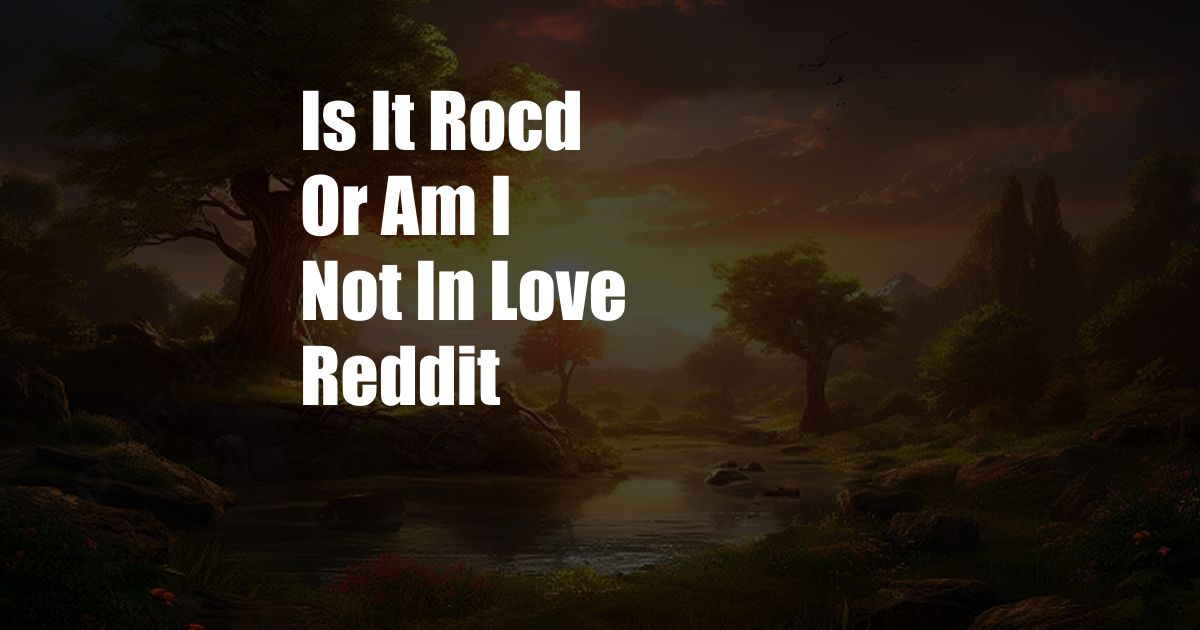
Is It ROCD or Am I Not in Love?
As I sat across from my therapist, tears welling up in my eyes, I couldn’t help but wonder, “Is it ROCD or am I simply not in love?” The line between relationship obsessive-compulsive disorder (ROCD) and genuine feelings of disenchantment had blurred, leaving me in a state of constant doubt and anxiety.
ROCD is a debilitating mental health condition that causes intrusive thoughts and intense anxiety about one’s relationship. It can manifest in various ways, including doubting the love for one’s partner, scrutinizing their flaws, and fearing abandonment or betrayal. Distinguishing between ROCD and genuine feelings of disenchantment is crucial for effective treatment and personal growth.
Understanding ROCD
ROCD is a subtype of obsessive-compulsive disorder (OCD). It is characterized by persistent, unwanted thoughts, images, or urges that create significant distress and anxiety. These thoughts often revolve around the relationship, leading to doubts, fears, and a constant need for reassurance.
Individuals with ROCD may experience intrusive thoughts about their partner’s attractiveness, compatibility, or love. They may also engage in compulsive behaviors, such as excessive checking, reassurance-seeking, or avoidance, in an attempt to reduce their anxiety.
Differentiating ROCD from Disenchantment
Disenchantment is a natural part of any relationship. Over time, the initial passion and excitement may fade, and feelings of love and commitment may evolve. However, genuine disenchantment is typically gradual and accompanied by a decrease in desire, trust, and intimacy.
In contrast, ROCD is characterized by sudden and intense doubts that often fluctuate. Individuals with ROCD may experience periods of intense love and affection, followed by overwhelming anxiety and doubt. They may also engage in compulsive behaviors that are not typically associated with genuine disenchantment.
Tips and Expert Advice
Differentiating between ROCD and genuine disenchantment can be challenging. Seeking professional help is essential for an accurate diagnosis and effective treatment. Here are some tips and expert advice:
- Seek therapy: A therapist can provide a safe and supportive environment to explore your thoughts, feelings, and behaviors. Therapy can help you understand the underlying causes of your anxiety and develop coping mechanisms.
- Practice mindfulness: Mindfulness techniques can help you become more aware of your thoughts and emotions without judgment. This can reduce the impact of intrusive thoughts and promote a sense of calm.
- Communicate with your partner: Open and honest communication is crucial. Explain your feelings and concerns to your partner and seek their support. Remember, they cannot help you if they are unaware of what you are going through.
FAQs
- Q: What are the symptoms of ROCD?
A: Symptoms of ROCD include intrusive thoughts about your relationship, fear of abandonment or betrayal, compulsive reassurance-seeking, and emotional distress.
- Q: How is ROCD treated?
A: ROCD is typically treated through a combination of therapy, medication, and self-help strategies such as mindfulness and journaling.
- Q: Can ROCD be cured?
A: While ROCD cannot be completely cured, it can be managed effectively with proper treatment. Symptoms can be significantly reduced, allowing individuals to lead fulfilling and healthy relationships.
- Q: What is the difference between ROCD and genuine disenchantment?
A: Genuine disenchantment typically involves a gradual loss of love, desire, and trust, while ROCD is characterized by sudden and intense doubts that fluctuate.
Conclusion
Differentiating between ROCD and genuine disenchantment requires careful consideration and professional guidance. Remember, you are not alone in this journey. Seeking support and actively engaging in treatment can empower you to overcome the challenges of ROCD and cultivate a healthy and fulfilling relationship.
If you are experiencing any of the symptoms described in this article, please reach out to a mental health professional for further evaluation and support. Your well-being is of utmost importance.
Are you struggling with relationship anxiety or questioning your feelings of love? Share your thoughts and experiences in the comments below. Let’s create a community of support and understanding.